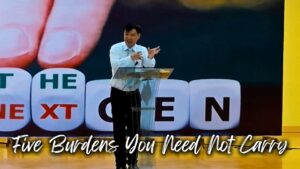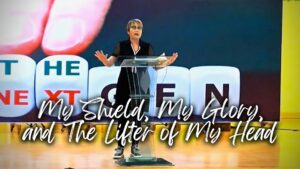KEY TEXT
1 Samuel 15:1-33 (NKJV)
1 Samuel also said to Saul, “The Lord sent me to anoint you king over His people, over Israel. Now therefore, heed the voice of the words of the Lord.
2 Thus says the Lord of hosts: ‘I will punish Amalek for what he did to Israel, how he ambushed him on the way when he came up from Egypt.
3 Now go and attack Amalek, and utterly destroy all that they have, and do not spare them. But kill both man and woman, infant and nursing child, ox and sheep, camel and donkey.’”
4 So Saul gathered the people together and numbered them in Telaim, two hundred thousand foot soldiers and ten thousand men of Judah.
5 And Saul came to a city of Amalek, and lay in wait in the valley.
6 Then Saul said to the Kenites, “Go, depart, get down from among the Amalekites, lest I destroy you with them. For you showed kindness to all the children of Israel when they came up out of Egypt.” So the Kenites departed from among the Amalekites.
7 And Saul attacked the Amalekites, from Havilah all the way to Shur, which is east of Egypt.
8 He also took Agag king of the Amalekites alive, and utterly destroyed all the people with the edge of the sword.
9 But Saul and the people spared Agag and the best of the sheep, the oxen, the fatlings, the lambs, and all that was good, and were unwilling to utterly destroy them. But everything despised and worthless, that they utterly destroyed.
10 Now the word of the Lord came to Samuel, saying,
11 “I greatly regret that I have set up Saul as king, for he has turned back from following Me, and has not performed My commandments.” And it grieved Samuel, and he cried out to the Lord all night.
12 So when Samuel rose early in the morning to meet Saul, it was told Samuel, saying, “Saul went to Carmel, and indeed, he set up a monument for himself; and he has gone on around, passed by, and gone down to Gilgal.”
13 Then Samuel went to Saul, and Saul said to him, “Blessed are you of the Lord! I have performed the commandment of the Lord.”
14 But Samuel said, “What then is this bleating of the sheep in my ears, and the lowing of the oxen which I hear?”
15 And Saul said, “They have brought them from the Amalekites; for the people spared the best of the sheep and the oxen, to sacrifice to the Lord your God; and the rest we have utterly destroyed.”
16 Then Samuel said to Saul, “Be quiet! And I will tell you what the Lord said to me last night. ”And he said to him, “Speak on.”
17 So Samuel said, “When you were little in your own eyes, were you not head of the tribes of Israel? And did not the Lord anoint you king over Israel?
18 Now the Lord sent you on a mission, and said, ‘Go, and utterly destroy the sinners, the Amalekites, and fight against them until they are consumed.’
19 Why then did you not obey the voice of the Lord? Why did you swoop down on the spoil, and do evil in the sight of the Lord?”
20 And Saul said to Samuel, “But I have obeyed the voice of the Lord, and gone on the mission on which the Lord sent me, and brought back Agag king of Amalek; I have utterly destroyed the Amalekites.
21 But the people took of the plunder, sheep and oxen, the best of the things which should have been utterly destroyed, to sacrifice to the Lord your God in Gilgal.”
22 So Samuel said: “Has the Lord as great delight in burnt offerings and sacrifices, As in obeying the voice of the Lord?Behold, to obey is better than sacrifice, And to heed than the fat of rams.
23 For rebellion is as the sin of witchcraft, And stubbornness is as iniquity and idolatry. Because you have rejected the word of the Lord,
He also has rejected you from being king.”
24 Then Saul said to Samuel, “I have sinned, for I have transgressed the commandment of the Lord and your words, because I feared the people and obeyed their voice.
25 Now therefore, please pardon my sin, and return with me, that I may worship the Lord.”
26 But Samuel said to Saul, “I will not return with you, for you have rejected the word of the Lord, and the Lord has rejected you from being king over Israel.”
27 And as Samuel turned around to go away, Saul seized the edge of his robe, and it tore.
28 So Samuel said to him, “The Lord has torn the kingdom of Israel from you today, and has given it to a neighbor of yours, who is better than you.
29 And also the Strength of Israel will not lie nor relent. For He is not a man, that He should relent.”
30 Then he said, “I have sinned; yet honor me now, please, before the elders of my people and before Israel, and return with me, that I may worship the Lord your God.”
31 So Samuel turned back after Saul, and Saul worshiped the Lord.
32 Then Samuel said, “Bring Agag king of the Amalekites here to me.” So Agag came to him cautiously. And Agag said, “Surely the bitterness of death is past.”
33 But Samuel said, “As your sword has made women childless, so shall your mother be childless among women.” And Samuel hacked Agag in pieces before the Lord in Gilgal.
INTRODUCTION
- An idiom -“Stubborn as a donkey”
The Bible actually mentions mules in relation to their STUBBORNNESS in Psalm 32:9- “Do not be like the horse or the mule, which have no understanding but must be controlled by bit and bridle.”
- Stubborn, donkey-like behavior in the Bible
The Bible records instances of stubborn, donkey-like behavior of human beings on occasions:
- Pharaoh
- The nation of Israel
- Astubborn and rebellious son (Deut 21:21)
- The Pharisees
- The Jews in Corinth (Acts 19:9).
- Those who persist in rejecting Christ
The sad result of such mulish obstinance:
Romans 2:5: “Because of your stubbornness and your unrepentant heart, you are storing up wrath against yourself for the day of God’s wrath, when his righteous judgment will be revealed.”
- Title
‘THE DONKEY AND THE LAMB’
Outline:
- What is Stubbornness?
- King Saul – A Study of Stubbornness
- Why is Stubbornness like iniquity and idolatry?
- The root causes of Stubbornness
- The cure – The Donkey and the Lamb
MAIN POINTS
(I). WHAT IS STUBBORNNESS?
The word “stubborn” appears five times and the word “stubbornness” twice in the KJV of the Bible.
The dictionary defines “stubbornness” as “having or showing persistent determination not to change one’s attitude or position on something especially in spite of good arguments or reason to do so. Difficult to move, remove or cure.”
The word “stubborn” takes on a vividness when broken down.
The root “stub” can be defined as “the stump of a tree; the short blunt part of anything after the large part has been broken off or used up.”
Picture the stiffness, rigidity or hardness of the stub of a weed which the mower has clipped near the ground.
The idea of “stubborn” thus becomes “fixed, resolute, unyielding; especially obstinate….difficult to handle, manage or treat; refractory.”
(II). KING SAUL- A STUDY OF STUBBORNNESS
If there is one man in the Bible who shows the donkey-like stubbornness, it is King Saul.
The characteristics of stubbornness portrayed by King Saul:
- Samuel calls Saul’s stubbornness “rebellion”
The cause of Saul’s stubbornness not to obey the command of God to completely wipe out the Amalekites is REBELLION.
He had “grown up” in his own estimation – no longer little in his own sight.
“So Samuel said, “When you were little in your own eyes, were you not head of the tribes of Israel? And did not the Lord anoint you king over Israel? (V17)”
Quite a change had come over him since the time of his anointing.
On another occasion he had “done foolishly and not kept the commandment of the Lord” (1 Sam 13:8-13).
Peace offering were to be offered at the door of the tabernacle (Lev 17:1-6) but due to his impatience over Samuel’s late arrival, he went ahead to offer it at Gilgal. Saul’s power had gone to his head.
Application: How often in our days do we see those who cannot become prosperous or power without losing their humility and submissiveness?
- Saul elevated his own thoughts over God’s instruction.
God said “utterly destroy”.
Saul thought the best of the spoil should be saved (v19) and the vile and worthless destroyed (verse 9).
What he thought to be good was in fact evil; because it was DISOBEDIENCE.
Application: What of those today who seek to improve upon what God has revealed regarding worship or the organization and work of the church?
- Saul justified himself and blamed others for his disobedience
He had understood his mission, for he admitted the spoil “should have been destroyed”.
He blamed the people and tried to rationalize their motive – they only did it to “sacrifice to the Lord thy God”.
- Samuel’s rebuke upon Saul
Samuel’s rebuke of Saul is stern and pointed. “Hath the Lord as great delight in burnt offerings and sacrifices, as in obeying the voice of the Lord?”
God does not require obedience to one commandment to the point of another being violated.
Application: God requires Christians to give but not to the point that they engage in dishonest effort in order to give or to give more.
What Samuel is saying to Saul is that God grades “A” for obedience – “to obey is better than sacrifice and to hearken than the fat of rams”.
Partial obedience is disobedience.
Samuel likens Saul’s rebellion unto witchcraft or divination, a practice definitely prohibited in Israel.
His “stubbornness is as iniquity and idolatry” and is disdainful to God.
- The results of Saul’s stubbornness
The kingdom is taken from him and Samuel, the seer, departs permanently from him.
The light he refused is darkened and the voice he rejected is silenced.
Even though Saul confessed his sin and worshipped God (verses 24-31), the effects of his sins were permanent –“The Lord hath rent the kingdom of Israel from thee this day….the Strength of Israel will not lie nor repent”.
From the study of Saul’s stubbornness, we can see that stubbornness has the following characteristics:
- Rebellion
- Self-exaltation
- Lack of submissiveness
- Witchcraft
- Idolatry
- Iniquity
(III). WHY IS STUBBORNNESS LIKE INIQUITY AND IDOLATRY?
Verse 23- And stubbornness is as iniquity and idolatry.
Samuel describes stubbornness as iniquity and idolatry
STUBBORNNESS AS INIQUITY
Before you know what “iniquity” is, you need to understand there are 3 levels of sin:
- Trespass = to cross a line or climbs a fence that he should not cross or climb. A trespass may be intentional or unintentional
- Transgression = to choose to INTENTIONALLY It is a WILLFULL TRESPASSING
- Iniquity= twistedness; premeditated choice; to continue sinning without repentance
God says stubbornness is INIQUITY – the worst level of sin.
Iniquity often refers to the INHERITED SINS that get passed from generation to generation.
The very nature of sin is stubborn.
It resists change.
Iniquity pitches a fit when someone wants to break free.
So next time you see a stubborn streak in your child, look in the mirror because they may have inherited it from your family tree.
Just as iniquity is a seed that moves from generation to generation, the sin of stubbornness will continue to flow in the family tree, unless someone says “no more.”
STUBBORNNESS AS IDOLATRY
Stubbornness is as idolatry because it manifests what idols accomplish.
An idol blocks the flow of God from fully operating in our life; stubbornness also accomplishes that.
It keeps us from fulfilling the work of God in our lives.
When we operate in stubbornness, we are often protecting an idol in our lives that we do not want to tear down.
We are not open to another perspective or input about our life.
Stubbornness protects us from being vulnerable.
Therefore, people who love and know you, CANNOT speak into your life.
There becomes a lot of “don’t go there” subjects in your life.
People often have to tip toe around you with certain subjects because stubbornness keeps you WALLED OFF.
The stubbornness is the hardness, the protective layer that does not allow truth to land softly on the heart.
It keeps truth at a distance, so we remain bound to the beliefs that we feel are right but may be off.
The danger of chronic stubbornness is that you become a standard to yourself with little to no helpful input.
It keeps you from being mentored or sharpened by other relationships.
God wants to tear down the idols that are built because of our brokenness and our twistedness, so that we may receive His healing love and truth.
In the OT, idols were often objects which worship was directed. They contaminated the Old Covenant dwelling of God’s presence.
In the New Covenant, we are the temple.
The idols we carry can be the STUBBORN ARGUMENTS AND MINDSETS THAT KEEP US FROM WALKING IN HUMILITY AND HEART TRANSFORMATION.
2 Corinthians 10:5- We destroy ARGUMENTS AND EVERY PROUD OBSTACLE to the knowledge of God, and take every thought captive to obey Christ.
Ecclesiastes 7:16 – Be not overly righteous, and do not make yourself too wise. Why should you destroy yourself?
We always interpret this verse as “do not be over spiritual”.
Solomon is not advocating moral laxity.
The word “righteous” in this text means “right in one’s cause”.
It is not referring exclusively to ethical or moral behavior.
Rather it is referring to being “right” or “just” in one’s cause (e.g., a legal case).
The counsel of Solomon is a WARNING AGAINST THE OBSESSION OF ALWAYS BEING PROVED RIGHT IN AN ARGUMENT OR DISPUTE.
To insist on this is ultimately SELF-DESTRUCTIVE.
People who have to win in every argument will eventually alienate everyone around them.
Argumentative people are stubborn people.
(IV). WHAT ARE THE ROOT CAUSES OF STUBBORNNESS?
What are the root causes?
- INSECURITY
Stubbornness is often a sign of insecurity and a way to hold on to a very fragile mental equilibrium.
Truly strong people know how to compromise when necessary.
Stubborn people are often fearful of change, which explains the rigidity that characterizes much of their behavior.
- DEFENSE MECHANISM
Stubbornness are defense mechanism used to avoid or cope with conscious conflict or anxiety.
It is used as a protective mechanism to keep the “enemy” out.
We use stubbornness to protect, defend, shied and fortify in an aim to preserve ourselves or others from harm.
Simply put, stubbornness is a means of protection that causes people to build walls in order to keep themselves safe.
- SELF PROMOTION
Stubbornness is only interested in ELEVATION and it usually uses good works to achieve its objective and to camouflage its hidden agenda.
When your whole focus is on achieving value and favor in the eyes of others, you can’t see your stubbornness.
When your whole focus is on self-promotion, you won’t see your stubbornness.
Therefore, it is impossible to call a stubborn person stubborn. They can’t see that they are stubborn.
Verse 30- Then he said, “I have sinned; yet honor me now, please, before the elders of my people and before Israel, and return with me, that I may worship the Lord your God.”
Even though Saul “worshipped God”, it wasn’t a real worship because deep inside him, he worshipped himself.
When you worship yourself more than God, you rebel against His explicit command.
And you thus open yourself to demons like King Saul.
No one believes they worship themselves as gods but that is because they don’t want to know that they are more stubborn than they like to admit it.
Stubbornness blinds us.
Look at the ripples of this sin of stubbornness in Saul:
- Hardening his heart
- Stiff-necked
- Inability to repent
- Inability to forgive
- Separation from God and His righteous servant
- Living in constant fear of what people think
- Insanely jealous
- Demon possession
- Eternal death
Stubbornness is really the refusal to worship anything but yourself and God hates it.
When stubbornness becomes rebellion, God leaves.
Looking at the root causes of stubbornness, there are the…
- idol of self,
- the idol of power,
- the idol of control
- and the idol of approval of man.
(V). THE CURE – THE DONKEY AND THE LAMB
Exodus 13:13 – Redeem with a lamb every firstborn donkey, but if you do not redeem it, break its neck.
Every firstborn male creature in the OT was the Lord’s.
The Israelites were to sacrifice every firstborn male animal of their livestock – of their CLEAN DOMESTIC ANIMALS: cattle, sheep and goats.
The blood of the RITUALLY CLEAN ANIMAL was sprinkled on the altar the Tabernacle; the fat of the animal was burned to the Lord; the meat was given to the priests and their families for food.
What was the law concerning the firstborn of UNCLEAN LIVESTOCK – of donkeys?
What to do with a donkey?
It could not be sacrificed at the Tabernacle. Its unclean blood could not be sprinkled on the holy altar. Its unclean meat could not be eaten by the priests and their families.
WHAT TO DO WITH THE UNCLEAN DONKEY?
The Israelite had a choice.
If he wanted to keep it (after all, donkeys were important as beasts of burden) – if he wanted to keep the donkey, he could redeem it with A LAMB.
He then would have to bring a lamb to the Tabernacle for sacrifice.
The lamb would have to die for the donkey.
If he did not want to sacrifice a lamb, then he had no choice but to break the donkey’s neck. He had to kill it.
What is this all about?
The context tells us that it has to do with the CONSECRATION (the setting apart) of the firstborn male of every Israelite woman and every domestic animal because of what God had done in Egypt, in the tenth plague.
The account of the Passover in Egypt
God had adopted Israel as His own – to be, as it were, His firstborn son.
As a sign of that adoption, God said every firstborn son in Israel is Mine.
As a memorial of that evening when God saved Israel and destroyed Egypt, the Israelites were to devote their eldest sons to God and to sacrifice the firstborn of their clean livestock.
It was a sign, a symbol, a commemoration of how the Lord had brought them out of Egypt.
And yet, we are left with that donkey.
“Redeem with a lamb every firstborn donkey, but if you do not redeem it, break its neck.”
What about this donkey?
Every firstborn creature – man or domestic animal – must be given to the Lord.
But since the donkey was unclean, it could not be presented in sacrifice.
What then? Should it be allowed to go free from the universal law?
No, it could not. God allows no exceptions. The donkey is rightfully His and yet it cannot be offered to him. The Israelite seemed to be trapped by conflicting regulations.
There was only one thing to do – BREAK THE UNCLEAN ANIMAL’S NECK OR……REDEEM IT.
The donkey could be saved by the
SUBSTITUTION OF A LAMB IN ITS PLACE.
That unclean animal, that donkey is US.
Like it or not, we are the donkey.
We are rightly the property of the Lord -the Lord who made us.
But the problem is that we, because of our iniquity – the Adamic nature in us – that stubbornness in us – are unacceptable to God. Our sins make us unclean.
There is only one thing to do with the unclean – break their necks. Destroy them. Get them away from the presence of God.
OR……REDEEM THEM.
Redeem them with a lamb, with THE LAMB, THE LAMB OF GOD.
The clean, pure, spotless Lamb of God, Christ Jesus.
The Lamb of God must stand in our stead.
He must stand in as our SUBSTITUTE. If not, we must die eternally in the land of the broken necks.
The spotless LAMB OF GOD has already been offered for you. He has already redeemed you from the deadly sin of stubbornness.
The Israelite must have wondered what to do when a firstborn male donkey was born. Which should die, the donkey or the lamb
The value of the two animals could be considered and compared. Whichever was of less value at the moment would die.
But surely, there was no comparison between the value of our souls and the life of the Lord Jesus.
And yet the Lamb dies and man the donkey is spared.
Christ died that we may live.
The blood of the Lamb was more precious than silver and gold and yet that blood bought us – dust of the earth.
The breaking of a donkey’s neck is one thing – a rather small thing.
A small thing when compared to the wrath to come.
The eternal wrath of God – that is much greater, much worse than the breaking of a donkey’s neck.
But that is the everlasting death from which Jesus Christ, the Lamb of God has redeemed us.
As the donkey ran free when the lamb was sacrificed, so we run free because the Lamb of God was sacrificed.
Like the donkey, we run free.
Application: Can you see yourself as that stubborn donkey that the Lamb of God had to die for in order to redeem our freedom?
If you can grasp this substitutionary death of Christ at the cross for you, you will no longer want to be that stubborn mule or donkey that needs to be bridle with a bit in order to curb us but you will be like that colt in Matthew 21:2-7 where Jesus told the disciples – “Go into the village in front of you, and immediately you will find a donkey tied and a colt with her. UNTIE THEM, and BRING THEM TO ME”.
In Mark 11:2-7 it says, “you will find a colt tied. Untie it ….and they brought the colt to Jesus and threw their cloaks on it and he SAT ON IT.”
A colt is a baby donkey.
It hasn’t been broken yet but it is tied (no freedom).
Jesus riding on an unbroken animal pointed to the use of “perfect” animals for sacrificial purposes.
Additionally in small way, it showed Jesus’ power over nature – even this inexperienced animal was submissive to him.
Jesus’ action fulfilled the prophecy of Zechariah 9:9: “Rejoice with all your heart, people of Zion. Shout in triumph, people of Jerusalem! Look! Your king is coming to you: He is righteous and victorious. He is humble and rides on a donkey, on a colt, a young pack animal”.
Why did Jesus sit on a colt and not a horse?
The young donkey (colt) symbolizes a combination of basic transportation with a generous dose of HUMILITY.
Many of us are like that colt tied.
We are tied to an authority like our parents, like our circumstances and station in life.
Nobody has ever sat on us.
But when it comes to Jesus, He has that authority to say to us – “Untie it; Bring it to me. I will ride on it”– triumphantly to fulfill the cry of the people “Hosanna” which means “Save us, please”.
The resurrected Christ today is commanding anything that is tying us down as that colt – that unbroken colt.
You are that unbroken colt because Christ’s brokenness has redeemed you to be the unbroken one.
And Christ is asking you to come to him. He will ride upon it. And He will put his cloak of righteousness upon you and ride upon you with HUMILITY.
Your life is no more yours. You are His. He has redeemed you, thus crucifying that idol called SELF.
You don’t have to be the god of yourself calling the shot and protecting yourself.
You can be confident with Christ as your Rider, submissive to His direction and humble – thus overthrowing the sin of stubbornness.
A stubborn colt can become the vehicle to bring hosana to people as long as it…..
- Is Untied by the substitutionary death of Christ
- Comes to Christ
- Submits to Christ as the Rider of its life
- Carries the purpose of God to the common people.
But if you are not willing, then God will use life to break your neck and you will be broken beyond healing.
“He who is often reproved yet stiffens his neck will suddenly be broken beyond healing” (Proverbs 29:1).
Psalm 32:9- “Do not be like the horse or the mule, which have no understanding but must be controlled by bit and bridle.”
CONCLUSION
We have been redeemed by the Lamb and we, the donkeys, need not be stubborn anymore but be like the Lamb of God – submissive and humble.
Let Jesus ride on you.




